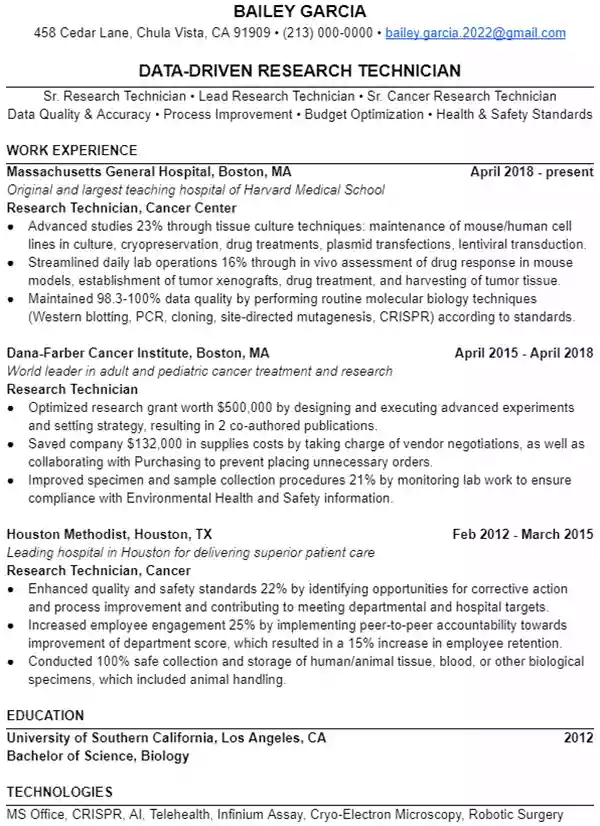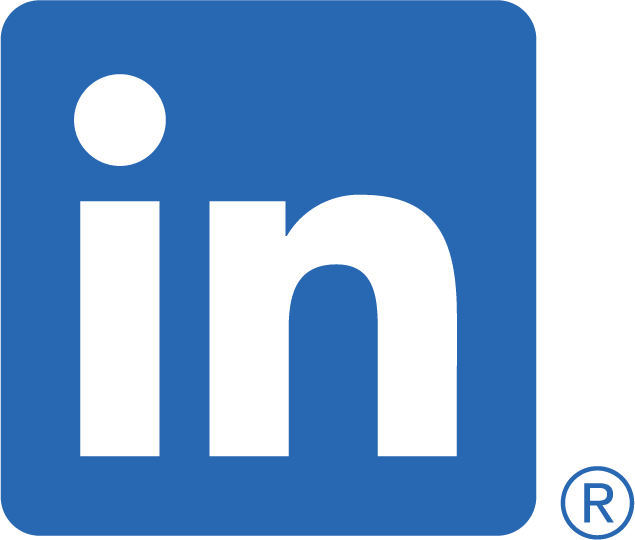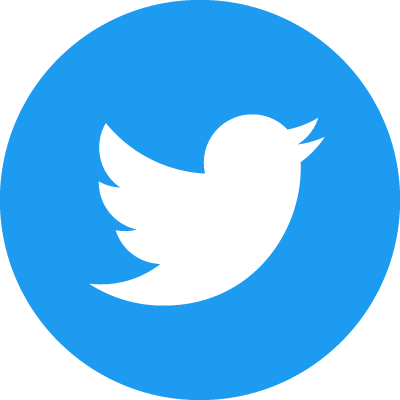Research Technician Resume Example
A resume template and step-by-step guide for a Research Technician


How to Write a Great a Research Technician Resume that Gets Interviews
Let’s be honest. The lab couldn’t run without the work of Research Technicians like you, and even though other names might be in the abstract, they’re likely the same people who asked you how to operate the lab equipment last week.
All that to say, you’re good at what you do…and there’s really no way to condense the dozens of responsibilities you hold in the lab into one piece of paper.
So you’ve landed here, and luckily, it’s the perfect place to learn how to write a Research Technician resume.
In this article, we’ll show you how to use your attention to detail, excellent reporting and methodical mind to create a stellar resume template that will land you in the lab of your dreams.
Wait, a resume template?
Yes. We could show you how to write a standard resume that you can disseminate to the masses of labs and see who bites. But since you value the scientific method and efficiency, we’ve done the experimenting for you. The results show that the mass dissemination method is not as effective as the resume template approach.
In this guide, we’ll show you how to create a template that can be customized for each Research Technician position you apply to. Many parts will remain the same (headline, work experience, education), but some will be tailored to highlight your compatibility with a specific lab position.
This is the tried and true method to write a resume that lands more interviews and job offers.
Prefer to have someone else write your Research Technician resume?
That’s an option, too. The experts behind this guide and resume example can write a custom Research Technician resume for you. Even better, they’ll do it for free (though tips are always appreciated).
How to Format a Research Technician Resume
There are five components to your resume:
- Professional Headline
- Summary
- Work Experience
- Education
- Keywords
Before we get started, here are a couple tips to make your resume easy to read for any recruiter:
Keep it Simple The single-column, straightforward format you see in the resume example is the best way to make your resume easy to scan and read. Avoid multiple columns, fonts or colors.
No Paragraphs For the recruiter who reads hundreds of resumes a day, they don’t want to read paragraphs. Make their job easy by placing all the information on your resume in lists and short phrases.
Name + Contact
Start with your full name top and center. Choose a font that’s professional and legible, then make your name slightly larger than the rest of the text. Directly below, add your contact information: phone number, email address and location (city and state).
What NOT to include: social accounts, weird email addresses, full mailing address or a second phone number.
The objective is to make it extremely easy and clear how to contact you for an interview. Fewer variables equals more positive outcomes.
Professional Headline
Think of this as the title to the scientific report of your career.
In three to five words, you’ll give the recruiter an immediate impression of who you are as a Research Technician and sum up who they’ll be reading about in the following resume.
Start with a slightly flattering adjective that puts you in a positive light. As a Research Technician, this might include: methodical, detail oriented, conscientious, reliable or efficient.
Then add a word to describe your level of experience (senior, junior, assistant, etc.), and if you only work in a specific field, include that, too (Medical lab, Clinical Lab, and so on).
Finally, top it off with your official job title: Research Technician.
This should leave you with something like: Industrious Senior Lab Research Technician.
Professional Summary
Your professional summary is the abstract of your resume.
Here you’ll outline the key parts of your career in list form. This is an overview of your resume with the most relevant information for their organization. For that reason, this section should be highly customized for each job position.
In the first line, list all the job titles you’d accept for your next role: Research Technician, Lab Technician, Medical Lab Technician, etc.
Most importantly, list the exact job title for the job you’re applying to.
In the second line, list all the skills and capabilities you have that qualify you for that targeted position. Think of the kind of lab you’re applying to and the equipment they might have; the specific role and what your responsibilities might be; and when you need some inspiration, check out the description in the original job listing and list the skills you have that they’re looking for.
The third and fourth lines are completely optional. In fact, if you’re just getting started as a Research Technician, you’ll probably just stick to lines one and two. Not to worry, the first two lines are enough to land you that highly-coveted interview.
If you have the experience and accolades, include your career achievements in line three and any awards and promotions you’ve received in line four.
Need a break?
It’s not too late to hand off your resume to the experts. Leet Resumes wrote this guide and resume example, and they can write yours, too. Try them today for free.
Work Experience
Everything in your resume until this point are subjective claims. The work experience is where you validate those claims with evidence.
Start by listing your previous work history with your most recent position first. Include your official job title, dates of employment and the name of each previous employer. (Refer to the resume example above on how this is formatted.)
Under each entry, add a bullet point list detailing the success you brought to that lab as a Research Technician.
This is not the place to list the mundane details of your lab work. Setting up, keeping logs, testing and monitoring are a given of being a Research Technician.
What a potential employer wants to see is how you’ll contribute to their lab. What results do you bring? How well do you perform your duties? What kind of workload can you handle?
Here’s how to give them the answers they’re looking for.
Use Numbers to Show Your Results
Instead of listing that you kept detailed logs of experiments, include how many logs for how many experiments.
Rather than reporting that you “analyzed substances,” be specific about how many in each batch, how many substances you analyzed, how many analyses you conducted in total and the frequency of these tests.
There are metrics everywhere in your work. Use this to your advantage and include as many numbers as possible in each bullet point of your work experience.
Use Strong Success Verbs
To keep your work experience focused on the results of your work, start every bullet point with a strong success verb that implies your positive contribution to the lab before you add any details.
These are words like boosted, increased, outperformed, exceeded, reduced, decreased or optimized.
Success verbs translate a bulleted entry from: “Completed accurate experiment logs for over 40 lab experiments”
To: “Decreased experiment log validation time by 20% by completing 100% accurate logs for over 40 lab experiments.”
Add Every Promotion
In addition to numbers and success verbs, promotions add the subjective evidence of the success of your work.
A previous employer promoting you through the technician ranks and increasing your responsibilities in the lab is a strong indicator that you produce accurate and reliable results and that you’re a trustworthy employee.
Education
Here you’ll list the basics of your education to provide context to your career.
Include where you attended school, your dates of attendance, the degree(s) you graduated with and any awards or honors you received.
If you participated in any notable university lab projects, you can list those here, too. But for all other extracurriculars and incomplete degrees, leave them off completely.
Keywords and Skills for Research Technician Resume
In the final section of your resume template, you’ll create a custom list of skills, technologies, and personal attributes that make you the perfect candidate for the technician position you’re targeting. Here are some examples to get you started, but remember to refer to the original job posting for more tailored ideas:
Soft Skills:
- Collaboration
- Attention to Detail
- Critical Thinking
- Problem Solving
- Project Management
- Time Management
- Excellent Verbal and Written Communication Skills
Hard Skills:
- Laboratory Skills
- DNA Base Editing
- Massively Parallel Reporter Assays
- Bench Research
- Protein Purification
- Inventory Management
- Data Management
Fields of Study:
- Molecular Genetics
- Biochemistry
- Microbiology
- Immunology
- Molecular Biology
Once the final keywords are in place, your resume is complete! Well done.
Can someone else write my resume for me?
Absolutely. If you’d like an expert to write your Research Technician resume, try Leet Resumes today. It’s completely free (though tips for a job well done are always appreciated).










